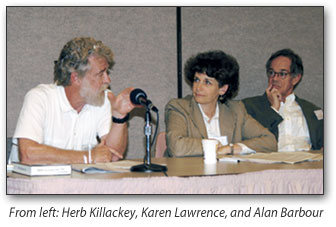
 |
Must the Promotion and Tenure Process Change?
Will new modes of scholarly communication necessitate significant changes in promotion and tenure review? A December 2003 program sponsored by the Libraries’ Scholarly Communication and Management Program (SCAMP) explored a wide variety of issues relevant within and across academic disciplines.
University Librarian Gerry Munoff introduced the program, titled “Advancing New Choices for Publishing: Changing Scenarios in Promotion and Tenure Reviews,” by outlining the need to address how the academic community functions as both producers and consumers of scholarly communication, a cycle within which scholarly outputs play a central role in the tenure and review process. AUL for Collections Lorelei Tanji introduced the panel of UCI faculty members, each of whom addressed a set of questions from two perspectives: the role each plays in the overall review process and the nature of their own academic discipline.
 Herb
Killackey, Associate Executive Vice Chancellor for Academic Affairs and
Professor of Neurobiology and Behavior, commented on advances in electronic
publishing,
noting that time efficiencies gained in the submission and publication
process benefit all disciplines.
He stressed that academic review values have not changed: quality and creativity
continue to be key; the output medium is secondary. We must still understand
the nature of the scholarly products that are key for each discipline. Documentation
supplied by academic departments must clearly articulate these discipline-specific
values in order to educate reviewers.
Herb
Killackey, Associate Executive Vice Chancellor for Academic Affairs and
Professor of Neurobiology and Behavior, commented on advances in electronic
publishing,
noting that time efficiencies gained in the submission and publication
process benefit all disciplines.
He stressed that academic review values have not changed: quality and creativity
continue to be key; the output medium is secondary. We must still understand
the nature of the scholarly products that are key for each discipline. Documentation
supplied by academic departments must clearly articulate these discipline-specific
values in order to educate reviewers.
Dean of Humanities and Professor of English and Comparative Literature Karen Lawrence stated that the book remains the most important unit of publication in the Humanities. Cutbacks by university presses are, however, having a huge negative impact on scholars’ ability to publish. A blend of strategies including support to university presses, consideration of alternative modes of publishing (such as peer-reviewed e-journals, e-repositories, and e-archives), and evaluation of the “first book” premise should be explored.
Alan Barbour, past chair of the Committee on Academic Personnel (CAP) and Professor of Microbiology and Molecular Genetics, noted that the UC Academic Senate is taking these issues very seriously and has formed a committee on scholarly communication. The new “Public Library of Science” is an example of scientists supporting open access to research while allowing authors to retain copyright. It will be interesting to evaluate the effectiveness of the project’s business model, in which the author is charged for submitting an article.
Chancellor’s Professor of Rhetoric Steve Mailloux noted that he gathered all the information for his presentation from the Internet, demonstrating how pervasive and effective electronic communication has become. He noted that this both “changes everything and changes nothing.” For example, the Modern Language Association’s policy on publication in electronic journals states that the criteria for evaluating a journal’s standing are the same whether it is published in print or online. Nevertheless, new media have the potential to change both the way scholars think (“rhetorical ecology”) and the nature of the reading experience itself.
Various other issues were raised during open discussion. User interaction with an electronic product can alter its output, with the consumer becoming a producer.
Junior faculty are the most likely to risk experimentation with new modes of publication and must be supported in such efforts. Works published only on the Web must be reliably preserved and access permanently maintained. Innovation and risk-taking must beencouraged, including within traditionally conservative disciplines. Finally, we must acknowledge that we are dealing with a mix of media, and that no medium is fully replacing any other.
In his wrap-up commentary, Rowland Davis, chair of CAP and Professor of Molecular Biology and Biochemistry, summarized the challenges that emerging modes of scholarship pose to reviewers and highlighted some of the challenges in evaluating “born digital” work. Munoff noted in closing the program that we are moving rapidly through various technological phases and are just beginning to realize their transformative possibilities for scholarly communication.
Must the promotion and tenure process change? The program reflected a consensus that many aspects of scholarly communications are changing and must be accommodated by the academic review process, but the underlying values remain the same.
Future SCAMP forums featuring campus journal editors and a discussion of author’s rights in the digital age are planned. See the SCAMP website (www.lib.uci.edu/scamp/home.html) for upcoming events and links to relevant online resources, or contact Lorelei Tanji (ltanji@uci.edu, x45216) for more information.